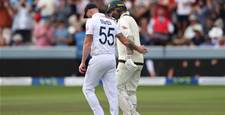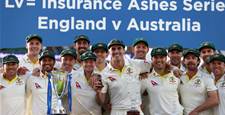Cast your mind back over the past two decades of Australian cricket and it’s easy to pass by Paul Reiffel.
Cast your mind back over the past two decades of Australian cricket and it’s easy to pass by Paul Reiffel.
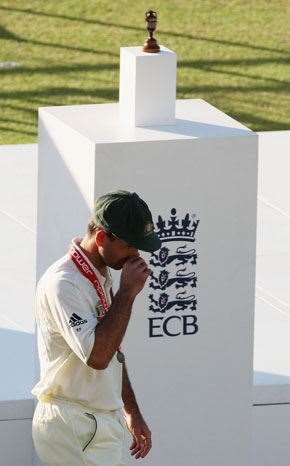 Reiffel reckons a lack of experience on English decks lost the Ashes for the Aussies, not Punter. Image: Getty Images
Reiffel reckons a lack of experience on English decks lost the Ashes for the Aussies, not Punter. Image: Getty ImagesHe was the man whose bowling was described as “nagging”, whose batting was described as “solid”. He was the quiet, self-effacing bloke who, upon retiring from the game in ’02, eschewed the glamour of the commentary box or coach’s seat for the grind of umpiring. But don’t underestimate the quality of Reiffel. This is a bloke whose Test bowling average (26.96) bettered Craig McDermott’s, whose Test batting average (26.52) placed him in the all-rounder bracket. In his first Ashes Test back in ’93 at Headingley he finished with eight wickets. Australia won by an innings and 48 runs. In the first innings of the following Test at Edgbaston he took 6/71 off 23 flawless overs. Australia won by eight wickets. Four years later in England he came into the team for the second Test. Australia was trailing 1-0 and floundering. He restored stability, snared another five-for in Leeds and the Aussies took a series lead they never relinquished. What we would have done for a bloke like Reiffel this time around …
Mate, Cricket Australia Umpire of the Year in ’08 – congratulations.
Yeah, thankyou …
When every other past player seems to be turning to the commentary box or the coach’s seat, why take up umpiring?
That’s a good question … When I first started it wasn’t an easy gig, and I asked myself that question a lot – why am I doing this? But I think last year provided me with the reason – entering the international stage in a small way, being involved in bigger games, the Shield final, the Ford Ranger Cup final. It was where I wanted to be – I wanted to be back out there, in amongst the excitement and the pressure. Everything I missed when I retired from cricket is there in umpiring.
As a player, in your wildest dreams did you ever countenance the thought of being an umpire?
No, not at all. As a player you’re caught in your own little world and you don’t see anyone else. I certainly didn’t see umpires in that world. It’s not the most high-profile job, and as a player I certainly had my moments with certain umpires. But it was in the last year of my playing career that CA decided they wanted to get some former players involved in umpiring and it just coincided with my retirement. I thought, ‘Wow, here’s an opportunity to do something different.’ It’s certainly a challenge and that’s what I needed when I retired.
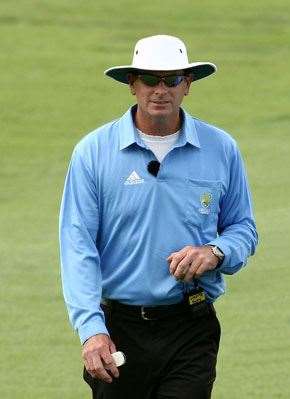 Reiffel Player turned umpire. Image: Getty Images
Reiffel Player turned umpire. Image: Getty ImagesDuring the second and third Ashes Tests, Shane Warne was getting stuck into the performance of South Africa’s Rudi Koertzen. Does commentary box criticism of the umpires frustrate you?
Not really, because everyone’s there to be criticised. If you make a mistake then you own up to it and move on. But when you’ve got to watch a replay four times to work out the umpire’s made a mistake, then it’s not a mistake. You know, he gets one shot at it in real time with the fieldsmen yelling at him and the crowd roaring. It’s a little more difficult than people think. Then again, these guys are top of the tree and they should be making good decisions. There’s no doubt about that …
You had considerable success during the ‘93 and ‘97 Ashes tours. Did you have to make significant adjustments when you bowled in England?
Personally I didn’t have to adjust at all because my style of bowling was so suited to English conditions. I just had to do what I’d always tried to do and that was bowl straight, seam up, put the pressure on. With the ball over there there’s plenty of swing, plenty of seam – if you put it in the right spot long enough something’s going to happen … But for the guys who want to bang it into the wicket, the out-and-out fast bowlers who want to go over there and bowl short, it just doesn’t work. You’ve just got to bowl a fuller length for a longer time over in England.
So did our fast bowlers fail to make that adjustment?
Well, it’s the first time they’ve been there, so it’s not an easy thing to just pick up … I thought they did pretty well. Look at the individuals throughout the Australian team; they outplayed the English in all the statistics – except the one that counts.
Given that individual statistical dominance of the Aussies, how did we lose the series?
It was just inexperience – we missed the crucial moments. When we were sailing well, everyone was going along with it. But when we had a bad session, no one put their hand up to stop it; they all crashed with each other. In a good side there’s one person who puts his hand up every session. They didn’t do that. They all went well in some sessions and all went badly in others. Look at the stats – we were way ahead of England and I think we’ve got a better team, but that doesn’t matter.
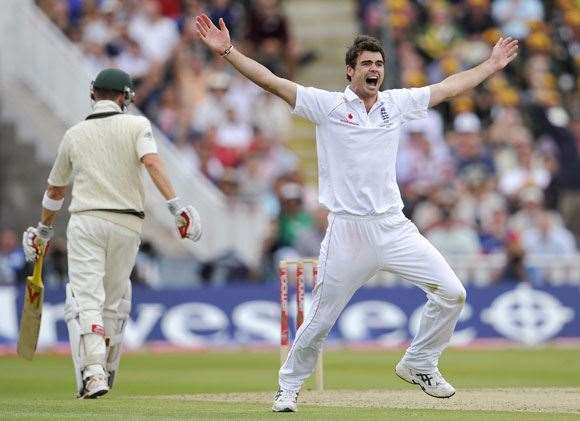 Anderson gets rid of Clarke at Edgbaston. What we’d have given for a Reiffel . Image: Getty Images
Anderson gets rid of Clarke at Edgbaston. What we’d have given for a Reiffel . Image: Getty ImagesIs that the captain’s failing?
No, I don’t think so … When you’ve got an inexperienced team your form fluctuates. The good sides even out their form so the distance between their worst and their best is never that much. In this Ashes series, the gap between Australia’s best and worst was huge. I don’t think that had anything to do with Ponting’s captaincy.
Ponting seemed to behave with considerable grace and dignity as a losing captain …
I didn’t notice him being any different. He’s a pretty hard-nosed character and he comes across that way sometimes. People get the wrong idea. Look, he’s quite clearly the leader of that team. I don’t see anyone else doing a better job than him.
Should Cricket Australia be concerned over this loss? After all, they were beaten by an English team minus their best batsman (Kevin Pietersen) and with Andrew Flintoff operating on one leg.
Well, Australia should’ve beaten them, there’s no doubt about that. Is there concern? I’m sure CA will look at it pretty closely because you don’t like losing, especially when you’ve got the better team, and statistically you perform as the better team. But I don’t think it’ll be a major concern. They’re rebuilding a team and Australia’s still producing some good players; our first class cricket is still very strong. The good players will come through – it just takes time.
Once again, England’s superior mastery of the swinging ball was a factor in this series. Why do they swing the ball better?
They just get more practice at it. You don’t get a lot of statistics show that each of our guys did pretty well at what they were doing.
Australia now sits at number four on the ICC Test rankings. Do you think this new level of competitiveness will reinvigorate Test cricket?
Well, we’ll have to wait and see. The Twenty20 game seems to have taken over and you have to think the Test game might get pushed to the side a little … Look, Test cricket’s always going to be strong in England and Australia and probably South Africa.
It’s the other countries around the world where you wonder if it’s taken that seriously. That’s where the ICC’s work is going to be cut out – making sure there’s still interest for Test cricket in those other countries.
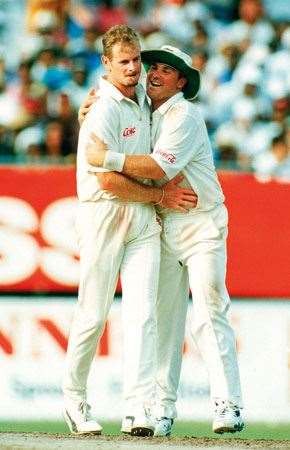 Reiffel’s post-playing career path differs from former team-mates’ like com-box star Shane Warne. Image: Getty Images
Reiffel’s post-playing career path differs from former team-mates’ like com-box star Shane Warne. Image: Getty ImagesSo Test cricket’s in danger of being marginalised?
Could be. I think there’s room for all the games, but you have to be smart in the way you administer them. If the ICC makes a few wrong decisions, Test cricket could easily get pushed aside. And that would be a real shame.
So what’s the smartest way of administering the three forms of the first class game?
Well, it’s just making sure there’s plenty of room in the calendar for all the games; you can’t put a priority on any single form of the game. You need to manage the whole lot so it’s got equal importance, so teams have got time to prepare for all forms of the game. It’s hard at the moment because the calendar’s getting so cluttered. You can see that certain series are not taken seriously because the teams have just come from another series, and there’s another one straight after. The danger is that it all becomes one big blur. The Ashes will always be significant, but the ICC has to make sure that other series have still got importance attached to them.
Where does the IPL fit in all that?
It’s there and it’s massive and you’re not going to get rid of it. So the ICC has to make sure the IPL is put in a timeframe where it sits there in its own right. They can’t try and hide it and play Test series over the top of it and force players to choose between Test cricket and IPL. It has to have its own little bracket. And it deserves recognition because it’s an important part of cricket now.
Going back to your umpiring, do you think umpires should have the benefit of camera technology?
I think that’s the way it’s going to go – they’re rolling it out across all Test matches from October onwards. Look, if you try to keep technology in the background, you’re bound to fail because technology’s taking over the world, so it’s not going to be any different in cricket. You’ve got to work with it. But I hope they spend as much money on the development of the umpires as they do on the technology. Sometimes I think that gets missed.
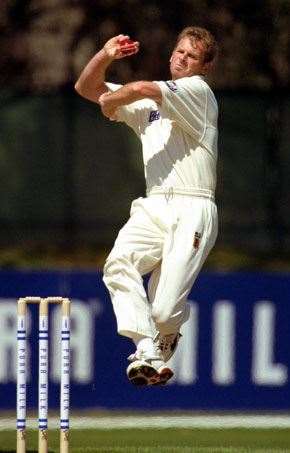 Reiffel’s post-playing career path differs from former team-mates’ like com-box star Shane Warne. Images: Getty Images
Reiffel’s post-playing career path differs from former team-mates’ like com-box star Shane Warne. Images: Getty ImagesRegarding this technology, what’s the ideal model? Should Hawkeye be used? How many challenges should a team have?
I don’t think anyone knows the answers to that. Personally I don’t like the fact that players can challenge an umpire; I think that’s against the spirit of the game, the way we’ve been brought up to accept the umpire’s decision. I’d like to think the technology could help the umpires, that they could use it without the players challenging them. And Hawkeye? Look, it has an error rate – ask the guys who built it and they’ll tell you there’s an error rate on it. But if everyone accepts Hawkeye, if everyone’s happy with its rulings, we might as well go with it.
What’s it like umpiring blokes you’ve played with?
It’s pretty easy, actually. I was a bit worried when I first started, thinking, ‘Gee, how am I going to go giving out guys who are mates?’ But it’s pretty easy. These are guys I’ve roomed with and toured with, so I know them intimately … At the end of the day it’s easier because they know you and so they accept what you do out there. They have a respect for you straight away; there’s an instant relationship. You know, umpiring is a lot about match management and player management, and that’s easier when you already know them.
It’s seemed over the past few decades that Victorian cricketers have been very much under-represented in the Australian team. Why’s that?
I don’t know – the state team has been pretty strong over the past few years. The AFL takes a lot of the young kids who would progress, there’s no doubt about that. The majority of the AFL draft comes out of Victoria and if you’re a 17-year-old student and the AFL comes knocking, then it’s an instant decision for them. They’re on good money and away they go. But I’m sure with the IPL and the money young players can earn at the state level now, there will be a lot of young kids who’ll roll the dice and decide to stay with cricket. Certainly the money that some of the state players are earning now is quite big, so it might be enticing.
– Aaron Scott
Related Articles
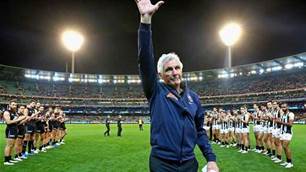
Round 5 of the AFL in pictures

Round 5 of the AFL in pictures





